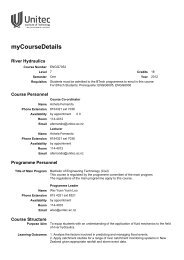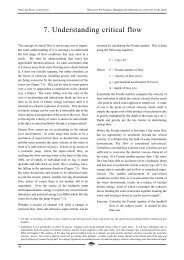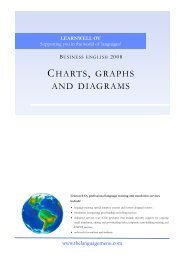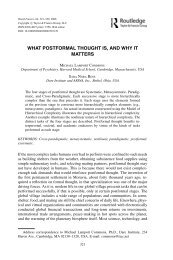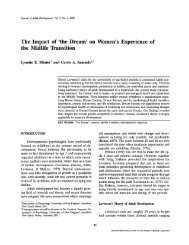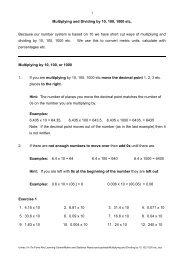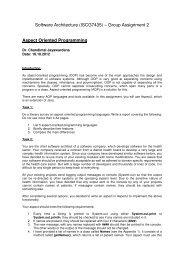Moral Development and Moral Education: An Overview
Moral Development and Moral Education: An Overview
Moral Development and Moral Education: An Overview
Create successful ePaper yourself
Turn your PDF publications into a flip-book with our unique Google optimized e-Paper software.
The goal of moral education, it then follows, is to encourage individuals to develop to the next<br />
stage of moral reasoning. Initial educational efforts employing Kohlberg's theory were grounded in<br />
basic Piagetian assumptions of cognitive development. <strong>Development</strong>, in this model, is not merely the<br />
result of gaining more knowledge, but rather consists of a sequence of qualitative changes in the<br />
way an individual thinks. Within any stage of development, thought is organized according to the<br />
constraints of that stage. <strong>An</strong> individual then interacts with the environment according to their basic<br />
underst<strong>and</strong>ings of the environment. However, the child will at some point encounter information which<br />
does not fit into their world view, forcing the child to adjust their view to accommodate this new<br />
information. This process is called equilibration, <strong>and</strong> it is through equilibration that development<br />
occurs. Early moral development approaches to education, therefore, sought to force students to<br />
ponder contradiction inherent to their present level of moral reasoning.<br />
The most common tool for doing this was to present a "moral dilemma" (see the FEATURED<br />
PRACTICES segment on this web site) <strong>and</strong> require students to determine <strong>and</strong> justify what course the<br />
actor in the dilemma should take. Through discussion, students should then be forced to face the<br />
contradictions present in any course of action not based on principles of justice or fairness.<br />
While Kohlberg appreciated the importance <strong>and</strong> value of such moral dilemma discussions, he<br />
held from very early on that moral education required more than individual reflection, but also needed<br />
to include experiences for students to operate as moral agents within a community. In this regard,<br />
Kohlberg reconciled some of the differences in orientation that existed between the theories of moral<br />
growth held by Piaget <strong>and</strong> Durkheim. In order to provide students with an optimal context within which<br />
to grow morally, Kohlberg <strong>and</strong> his colleagues developed the "just community" schools approach<br />
towards promoting moral development (Power, Higgins, & Kohlberg, 1989). The basic premise of<br />
these schools is to enhance students' moral development by offering them the chance to participate<br />
in a democratic community. Here, democracy refers to more than simply casting a vote. It entails full<br />
participation of community members in arriving at consensual rather than "majority rules" decisionmaking.<br />
One primary feature of these schools is their relatively small size (often they are actually<br />
schools within schools), aimed at providing the students with a sense of belonging to a group which is<br />
responsive to individual needs. The central institution of these schools is a community meeting in<br />
which issues related to life <strong>and</strong> discipline in the schools are discussed <strong>and</strong> democratically decided,<br />
with an equal value placed on the voices of students <strong>and</strong> teachers. <strong>An</strong> underlying goal of these<br />
meetings is to establish collective norms which express fairness for all members of the community. It<br />
is believed that by placing the responsibility of determining <strong>and</strong> enforcing rules on students, they will<br />
take prosocial behavior more seriously. At the same time, this approach stems from the cognitivedevelopmentalist<br />
view that discussion of moral dilemmas can stimulate moral development.<br />
However, this is not to say that just community school simply leaves students to their own<br />
devices; teachers play a crucial leadership role in these discussions, promoting rules <strong>and</strong> norms<br />
which have a concern for justice <strong>and</strong> community, <strong>and</strong> ultimately enforcing the rules. This role is not an<br />
easy one, as teachers must listen closely <strong>and</strong> underst<strong>and</strong> a student's reasoning, in order to help the<br />
student to the next level of reasoning. This requires a delicate balance between letting the students<br />
make decisions, <strong>and</strong> advocating in a way which shows them the limits in their reasoning. A primary<br />
advantage to the Just Community approach is its effectiveness in affecting students actions, not just<br />
their reasoning. Students are, in effect, expected to "practice what they preach", by following the rules<br />
determined in community meetings.<br />
The most comprehensive <strong>and</strong> authoritative source for work on Kohlberg's approach to moral<br />
education is to be found in : Power, F. C., Higgins, A., & Kohlberg, L. (1989). "Lawrence Kohlberg's<br />
Approach to <strong>Moral</strong> <strong>Education</strong>." New York: Columbia University Press.<br />
IV. Domain Theory: Distinguishing <strong>Moral</strong>ity <strong>and</strong> Convention<br />
In the early 1970s, longitudinal studies conducted by the Kohlberg research group began to<br />
reveal anomalies in the stage sequence. Researchers committed to the basic Kohlberg<br />
framework attempted to resolve those anomalies through adjustments in the stage descriptions (see<br />
the Power, Higgins, & Kohlberg, 1989 reference for an account of those changes). Other theorists,<br />
however, found that a comprehensive resolution to the anomalous data required substantial<br />
adjustments in the theory itself. One of the most productive lines of research to come out of that<br />
period has been the domain theory advanced by Elliot Turiel <strong>and</strong> his colleagues.



